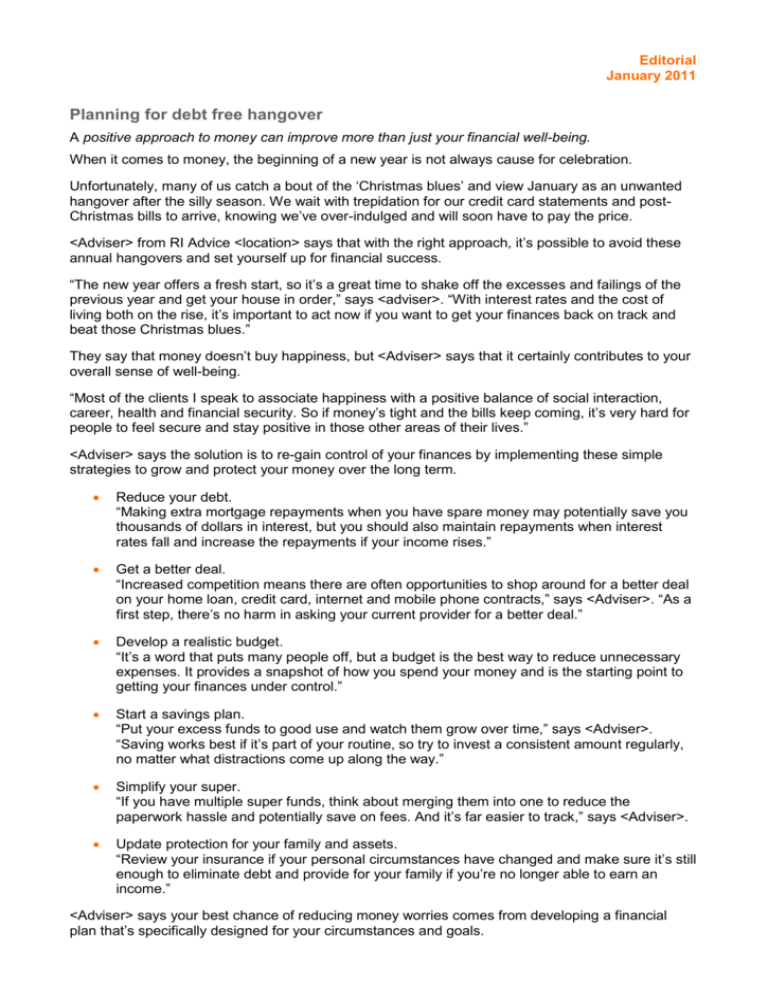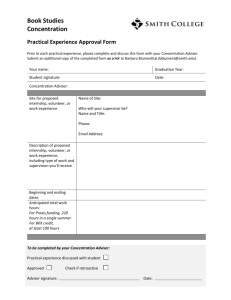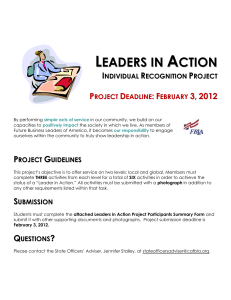Planning for debt free hangover
advertisement

Editorial January 2011 Planning for debt free hangover A positive approach to money can improve more than just your financial well-being. When it comes to money, the beginning of a new year is not always cause for celebration. Unfortunately, many of us catch a bout of the ‘Christmas blues’ and view January as an unwanted hangover after the silly season. We wait with trepidation for our credit card statements and postChristmas bills to arrive, knowing we’ve over-indulged and will soon have to pay the price. <Adviser> from RI Advice <location> says that with the right approach, it’s possible to avoid these annual hangovers and set yourself up for financial success. “The new year offers a fresh start, so it’s a great time to shake off the excesses and failings of the previous year and get your house in order,” says <adviser>. “With interest rates and the cost of living both on the rise, it’s important to act now if you want to get your finances back on track and beat those Christmas blues.” They say that money doesn’t buy happiness, but <Adviser> says that it certainly contributes to your overall sense of well-being. “Most of the clients I speak to associate happiness with a positive balance of social interaction, career, health and financial security. So if money’s tight and the bills keep coming, it’s very hard for people to feel secure and stay positive in those other areas of their lives.” <Adviser> says the solution is to re-gain control of your finances by implementing these simple strategies to grow and protect your money over the long term. Reduce your debt. “Making extra mortgage repayments when you have spare money may potentially save you thousands of dollars in interest, but you should also maintain repayments when interest rates fall and increase the repayments if your income rises.” Get a better deal. “Increased competition means there are often opportunities to shop around for a better deal on your home loan, credit card, internet and mobile phone contracts,” says <Adviser>. “As a first step, there’s no harm in asking your current provider for a better deal.” Develop a realistic budget. “It’s a word that puts many people off, but a budget is the best way to reduce unnecessary expenses. It provides a snapshot of how you spend your money and is the starting point to getting your finances under control.” Start a savings plan. “Put your excess funds to good use and watch them grow over time,” says <Adviser>. “Saving works best if it’s part of your routine, so try to invest a consistent amount regularly, no matter what distractions come up along the way.” Simplify your super. “If you have multiple super funds, think about merging them into one to reduce the paperwork hassle and potentially save on fees. And it’s far easier to track,” says <Adviser>. Update protection for your family and assets. “Review your insurance if your personal circumstances have changed and make sure it’s still enough to eliminate debt and provide for your family if you’re no longer able to earn an income.” <Adviser> says your best chance of reducing money worries comes from developing a financial plan that’s specifically designed for your circumstances and goals. “My most financially successful clients realise that money is simply the fuel to help us reach our goals, rather than the destination itself,” <he/she> says. “Designing a financial plan that’s based on helping you achieve your lifestyle ambitions is the key to financial well-being. For further information contact <Adviser> from <office> on <phone>. *<Adviser> is an Authorised Representative of RI Advice Group Pty Limited ABN 23 001 774 125, AFSL 238429. This editorial does not consider your personal circumstances and is of a general nature only. You should not act on the information provided without first obtaining professional financial advice specific to your circumstances.



![Literature Option [doc] - Department of French and Italian](http://s3.studylib.net/store/data/006916848_1-f8194c2266edb737cddebfb8fa0250f1-300x300.png)


